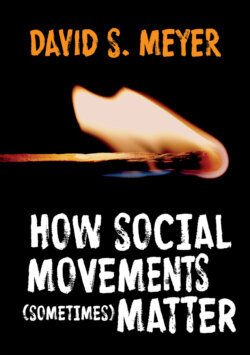How Social Movements (Sometimes) Matter

Реклама. ООО «ЛитРес», ИНН: 7719571260.
Оглавление
David S. Meyer. How Social Movements (Sometimes) Matter
Table of Contents
Guide
Pages
Dedication
How Social Movements (Sometimes) Matter
Copyright Page
Acknowledgments
Introduction
Notes
CHAPTER 1 Why Movements Emerge and How They Work
Social Movements, Events, and Political Context
Elements of Political Protest
Challenging and Entering Political Institutions
Summing Up
Notes
CHAPTER 2 Protest, Revolution, and Regime Change
Inspiring and Cautionary Examples
A Theory of Revolution
Adopting, Adapting, and Spreading a Model
The South African Story
The Revolutions of 1989
Hungary
Poland
Czechoslovakia
Bulgaria
Romania
East Germany
Notes
CHAPTER 3 Protest and Policy
Policy Reform and Democracy
Competing For Attention: Agenda Setting
Policy Arenas
Business and Movements
Public Policy and Governance
War and the Draft
Humane Food Production: Did the Eggs Come First?
Earth Day and the Politics of Commemoration
The Politics of Nuclear Power
Abortion and Reproductive Rights
The Yellow Vest Protests
University Student Fees in the United Kingdom
Summary
Notes
CHAPTER 4 Protest, Organizations, and Institutionalization
The Organizational Dilemma and Institutionalization
Organized Labor, Recognized and Institutionalized
Movements Establish Organizations
Jane Addams and the Politics of Peace and Justice
W.E.B. Du Bois, the NAACP, and the Struggle for Racial Justice
Movement Parties and Green Politics
Organizational Afterlives
Notes
CHAPTER 5 Protest Movements, Culture, and Participants
Accessing and Assessing Culture
Movements Change the People Who Make Them
Notes
CHAPTER 6 Claiming Credit
Social Movement Outcomes: You Can’t Ever Get All You Want
Claiming Influence in Politics and Culture
Social Movements Cultivate a Reputation for Influence
Social Change Happens Slowly, Then Suddenly7
Constructing Causality and Telling Stories
Why Some Movement Stories Win
Movement Goals
Organizational Survival and the Politics of Coalitions
The Risks of Victories
Marching into and through Institutions: Constituencies and Claimants
Why Claiming Credit Matters
Summary
Notes
References
Index
POLITY END USER LICENSE AGREEMENT
Отрывок из книги
To Zena, Jean, and their generation, who will remake the world.
And to Bill Gamson, who always reminded me of that fact.
.....
Social movements also change the people who participate in them, educating as well as mobilizing activists. They promote ongoing awareness and action that extends beyond the boundaries of one movement or campaign. Those who turn out at antiwar demonstrations today have often cut their activist teeth mobilizing against globalization, on behalf of labor, for animal rights or against welfare reform. By politicizing communities, connecting people, and promoting personal loyalties, social movements build the infrastructure not only of subsequent movements, but of a democratic civil society more generally.
In chapter 6, we’ll look at how we understand the impact and influence of movements. Popular histories tell stories about movements (or omitting movements) that don’t necessarily line up with broadly understood facts. We tend to tell event and leader-centered stories that abbreviate the historical process of social change. This is understandable: brave leaders and dramatic events make for a better story than the much more difficult and time-consuming processes of changing the world. Activists have to work to recognize their influence, and then claim credit for it. Because movements never get exactly what they seek, and depend upon a host of outside factors to be influential, it’s easy to miss the impact of protest; moreover, the accuracy of a story isn’t the only factor that affects the acceptance of a story. A compelling account matters, as does the position of the person telling it. We will look at how the accepted understandings of the movements of the past affect the movements and activist campaigns that emerge in the future.
.....